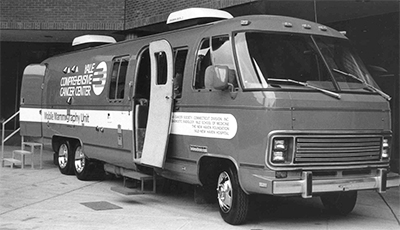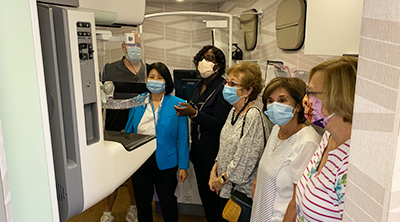
Popular Locations
- Yale New Haven Children's Hospital
- Yale New Haven Hospital - York Street Campus
- Yale New Haven Hospital - Saint Raphael Campus

In the late 1980s, Yale New Haven Hospital radiologic technologists Jean DeRiso and Deane Poirier had an opportunity to take their careers in a slightly different direction – actually, many different directions.
The Yale Comprehensive Cancer Center was about to launch its brand-new mobile mammography unit and needed radiologic technologists to staff it. DeRiso signed up and encouraged Poirier to join her.
On July 9, 1987, the two technologists and coordinator Judi Gargiulo hit the road for the first time in what was euphemistically called the mammography “van.” Actually, it was a 33-foot-long, 8-ton Airstream coach; and DeRiso and Poirier had to take lessons and get their commercial drivers’ licenses to drive it.
“There was a learning curve at first” for many aspects of the mobile mammography unit’s operations, Poirier said. “But people loved it.”


On Wednesday, July 27, Yale New Haven Health will mark the 35th anniversary of the mobile mammography unit’s launch, with a celebration from 11:30 am - 1 pm at One Long Wharf in New Haven. People are invited to tour the newest unit and meet staff members.
This unit is the fourth in the mobile mammography program’s history, and was the first such unit in the country equipped with both 3D mammography and screening ultrasound. It is staffed by a mammography technologist and mammography ultrasound technologist, along with a mammography assistant. As with images taken at YNHH’s brick-and-mortar sites, mammogram and breast ultrasound images taken in the mobile unit are electronically sent to YNHH radiologists for reading. YNHH’s is the first mobile unit in the country to add 5G for transmitting images at a high speed.
“We have world-class imaging at the hospital; we needed to extend that to the communities,” said Jacquelyn Crenshaw, senior manager, Breast Imaging. “This is part of Yale New Haven Health’s mission.”
Back in 1987, the original mammography van’s first stop was a community site in Guilford. Since then, staff have been providing advanced screenings for women who meet American Cancer Society age guidelines throughout Connecticut. Visiting medically underserved areas has always been part of the mobile mammography program’s mission, but it serves women of all socioeconomic backgrounds. The unit spends five days a week visiting community clinics, shopping plazas, corporations, senior housing complexes, health fairs and many other locations and events.
People appreciate being able to get a mammogram and ultrasound within an hour, close to where they live or work, Crenshaw said. That convenience became particularly important during the height of the COVID-19 pandemic, when many patients couldn’t come to the hospital. From October 2020 to December 2021, unit staff saw more than 4,000 patients, compared to the average 1,000 patients a year.
Crenshaw and Poirier agreed that the biggest advantage of the mobile mammography unit is expanding people’s access – to advanced technology, expert staff and physicians and vital information about their health.
Poirier recalled early visits to a New Haven health clinic where, at first, many women were reluctant to have mammograms. That soon changed.
“People at the clinic advocated for our services,” Poirier said. “They explained to people that mammograms can help save lives.”